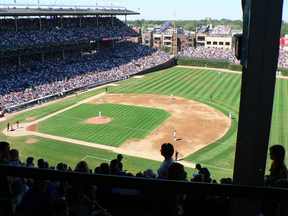
“A Nice Little Place on the North Side” by George Will, Crown Publishing.
When conservative pundit George Will writes a book about baseball, you can be sure it won’t be a sentimental, romanticized or emotional look the game, which far too often lends itself to such analysis by those who wax rhapsodic about the game’s place in the fabric of American culture.
| | This is true even though he is, of all things, a Cubs fan. But that’s what makes “A Nice Little Place on the North Side,” Will’s examination of Chicago’s Wrigley Field at the beginning of its 100th year of existence, such an interesting read. Few places in the baseball world lend themselves more toward romance and a sense of the game’s tether to the past than Wrigley, which sits wedged into a north Chicago neighborhood, little changed from how it looked when your great grandparents roamed the earth. Will brings all that down to ground level. Fans will be happy to know Wrigley still emerges as a great sports venue. “It’s loveliness,” he tells us, “is a function of how real it is, of its practicality.” And yet, he muses, the stadium should come with warning signs like those on cigarettes, because, as any fan knows, it “is a gateway to neurological difficulties.” As baseball books go, this one is a nice companion for an early spring day in an age when cynicism abounds but has not yet been able to penetrate the hearts of true believers in the magic of the diamonds. Not to mention, it is a good preface to what almost certainly will be another losing season for the Chicago Cubs. “The only real resemblance between Wrigley Field and heaven is that the ballpark is indeed the final destination of some Cub fans,” Will writes, just before recounting how fans often discretely open urns on the sidelines and deposit the ashes of a loved one to fulfill a dying wish, as stadium officials discretely look the other way. “Never mind,” he writes, “that before this heavenly place on the North Side could be built, a Lutheran seminary had to be torn down.” That is the type of gritty, dispassionate cynicism that ought to appeal to fans of a legendarily hapless team. As with any good baseball book, this one is filled with anecdotes — some familiar, some comical, and some you probably hadn’t heard. We learn, for instance, that Bill Veeck, when he was in charge of the stadium’s concessions, hired an ethically challenged vendor prone to hustling customers by, among other things, placing toys in the hands of children and demanding their parents pay up. The vendor? Jacob Leon Rubenstein, who later changed his name to Jack Ruby, moved to Dallas and shot Lee Harvey Oswald, gaining eternal infamy as part of Kennedy assassination lore. Be careful from whom you buy popcorn. But the most intriguing part of this book is Will’s premise that Wrigley Field itself may be to blame for the Cubs’ perennially inept performance on the field, and for the team not having won a World Series since 1908. Philip Knight Wrigley, himself, who inherited ownership of the team and stadium, defined a marketing strategy many years ago of selling a nice day at the ballpark, rather than a winning team. “We are aiming at people not interested in baseball,” he said. And so the team did not install stadium lights until 1985 and still limits night games to conform to the wishes of nearby residents and business owners. Will cites evidence that the Cubs are the only franchise in baseball whose attendance does not fluctuate with wins and losses, but with the price of stadium beer. The stadium, in other words, keeps the team from focusing on winning. Will is not completely devoid of sentiment. He would not move the team to some new retro stadium in the suburbs. But he would have Cubs fans acknowledge the stadium needs a major upgrade, including the addition of accommodations for modern workout equipment and other technologies players rely upon to be competitive. Those things are coming, but they still will be a hard sell. Americans, Gen. George Patton told the Third Amy before the landing at Normandy, “will not tolerate a loser.” That may be true. But lovable losers are something else entirely. For many baseball fans, these are not to be messed with if it requires a move to the 21st century. |

 RSS Feed
RSS Feed

